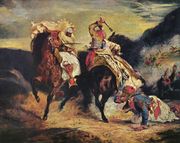
Giaour
Encyclopedia

Turkish language
Turkish is a language spoken as a native language by over 83 million people worldwide, making it the most commonly spoken of the Turkic languages. Its speakers are located predominantly in Turkey and Northern Cyprus with smaller groups in Iraq, Greece, Bulgaria, the Republic of Macedonia, Kosovo,...
, is an offensive ethnic slur used by Muslims in Turkey
Turkey
Turkey , known officially as the Republic of Turkey , is a Eurasian country located in Western Asia and in East Thrace in Southeastern Europe...
and the Balkans
Balkans
The Balkans is a geopolitical and cultural region of southeastern Europe...
to describe all who are non Muslim, with particular reference to Christians like Greeks, Armenians, Bulgarians
Bulgarians
The Bulgarians are a South Slavic nation and ethnic group native to Bulgaria and neighbouring regions. Emigration has resulted in immigrant communities in a number of other countries.-History and ethnogenesis:...
, Serbs
Serbs
The Serbs are a South Slavic ethnic group of the Balkans and southern Central Europe. Serbs are located mainly in Serbia, Montenegro and Bosnia and Herzegovina, and form a sizable minority in Croatia, the Republic of Macedonia and Slovenia. Likewise, Serbs are an officially recognized minority in...
and Assyrians
Assyrian people
The Assyrian people are a distinct ethnic group whose origins lie in ancient Mesopotamia...
. The term is considered highly offensive by Christians in the Balkans.
The 1911 Encyclopedia Britannica described the term as follows:
Giaour (a Turkish adaptation of the PersianPersian languagePersian is an Iranian language within the Indo-Iranian branch of the Indo-European languages. It is primarily spoken in Iran, Afghanistan, Tajikistan and countries which historically came under Persian influence...
gdwr or gbr, an infidelInfidelAn infidel is one who has no religious beliefs, or who doubts or rejects the central tenets of a particular religion – especially in reference to Christianity or Islam....
), a word used by the Turks to describe all who are not Moslems, with especial reference to Christians. The word, first employed as a term of contempt and reproach, has become so general that in most cases no insult is intended in its use; similarly, in parts of China, the term foreign devil has become void of offence. A strict analogy to giaour is found in the Arabic kafirKafirKafir is an Arabic term used in a Islamic doctrinal sense, usually translated as "unbeliever" or "disbeliever"...
, or unbeliever, which is so commonly in use as to have become the proper name of peoples and countries.
See also
- The GiaourThe Giaour"The Giaour" is a poem by Lord Byron first published in 1813 and the first in the series of his Oriental romances. "The Giaour" proved to be a great success when published, consolidating Byron's reputation critically and commercially.-Background:...
, a poem by Lord Byron - KafirKafirKafir is an Arabic term used in a Islamic doctrinal sense, usually translated as "unbeliever" or "disbeliever"...
, KaffirKafirKafir is an Arabic term used in a Islamic doctrinal sense, usually translated as "unbeliever" or "disbeliever"... - DhimmiDhimmiA , is a non-Muslim subject of a state governed in accordance with sharia law. Linguistically, the word means "one whose responsibility has been taken". This has to be understood in the context of the definition of state in Islam...
- RayahRayahA rayah or reaya was a member of the tax-paying lower class of Ottoman society, in contrast to the askeri and kul...
- Ary SchefferAry SchefferAry Scheffer , French painter of Dutch and German extraction, was born in Dordrecht.-Life:After the early death of his father Johann Baptist, a poor painter, Ary's mother Cornelia, herself a painter and daughter of landscapist Arie Lamme, took him to Paris and placed him in the studio of...
, "Le Giaour", 1832, oil on canvas, Musée de la Vie romantiqueMusée de la Vie RomantiqueThe Musée de la Vie romantique stands at the foot of Montmartre hill in the IXe arrondissement, 16 rue Chaptal, Paris, France in a 1830 hôtel particulier facing two twin-studios, a greenhouse, a small garden, and a paved courtyard. The museum is open daily except Monday. Permanent collections are...
, Hôtel Scheffer-Renan, Paris

